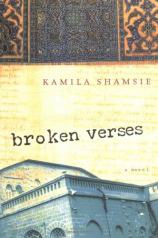Reading Group Guide
Discussion Questions
Broken Verses

1. From the ocean scene painted on Aasmaani's bedroom walls to Aasmaani's memories on the beach with the Poet, Shamsie uses images of water to explore Aasmaani's character. At one point Aasmaani remembers, "But you and I, [the Poet would] tell me, we are creatures of water" (page 30). How is Aasmaani a creature of water? How is the Poet? Would you define Samina as a creature of water? With what element would you align yourself?
2. Discuss the Poet's most famous poem, "Laila." How are the Poet and Samina like Laila and Qais? How is "Laila" important to Aasmaani and how is it important to Broken Verses as a whole?
3. "Language is both most vexing and most rewarding in its imprecision and multiplicity, the Poet used to say" (page 53). What role does language play in the novel? How does language affect Aasmaani and how does she both use it and ignore it?
4. Whenever Aasmaani thinks she sees her mother out of the corner of her eye, she calls it a "Fata Morgana," a term she found reading Conrad, meaning a mirage or looming effect (page 67). How does assigning a name to these apparitions help Aasmaani? Why is it important that this name not come from a Greek myth?
5. Many of the characters in the book have different names. What is the importance of names? What does Aasmaani's name mean and how does it reflect her personality? Why does Aasmaani disdain Ed's name? How many different names does the Poet have and what do each of them represent about him?
6. On page 68, Aasmaani's father states, "Fathers are less significant and so less capable of doing damage." Do you think this is true? How else are fathers portrayed in Broken Verses? Did you find these portrayals to be culturally defined or can they also relate to American fathers?
7. Aasmaani struggles with Samina's role as both political activist and mother. Her love is often overshadowed by her anger for Samina's frequent absences during Aasmaani's childhood and then for her ultimate disappearance. What does it mean for Aasmaani to finally let go of the idea that Samina may still be alive? Considering the sacred role mothers play in Pakistan and all that you know of Samina's life, do you think Samina was a bad mother? What about Shahnez? In addition to Beema, what statement does the author make about motherhood using these three women's very different approaches to their children?
8. As the book progresses, Aasmaani presents many different interpretations of Samina's and the Poet's history. Rabia is often the voice of reason that Aasmaani resists. Does Rabia end up being right? What do you think of the sisters' relationship? Why is it important?
9. Through Aasmaani and Ed, Shamsie explores what it means to be the child of a celebrity. How do their characters differ from Rabia, and to what extent is it because of their mothers' status?
10. When Aasmaani meets with Mirza the Snake, he tells her the Poet translated Macbeth because it was the shortest Shakespeare play (page 222). What other clues does Aasmaani ignore as to the authenticity of the Poet's letters? How does the author hint at the truth? What do you learn about the Poet as Aasmaani reads through his biography before STD posts it on its Web site? Why doesn't she make any changes?
11. Discuss Aasmaani's mental health. How are her symptoms like her mother's and how are they different? How do you feel about the way Beema and Rabia treat Aasmaani in regards to her mental state?
12. According to the Sufis interpretation of Hell (Sufism is the inner, mystic, or esoteric realm of Islam): "Hell is nothing more or less than the absence of the Beloved." In what different ways does Aasmaani interpret this statement? What does it mean for the Poet? How does Aasmaani feel about it after she learns the truth about the Poet's letters?
13. Compare Aasmaani's relationship with Ed to Samina's relationship with the Poet. Aasmaani likens her relationship with Ed to the story of Merlin and Nimue, while Samina and the Poet are compared to Layla and Qai. What does this say about the differences or similarities of their relationships? Can you quantify love? Why does Aasmaani need a mythical story to explain things in her life? How did you perceive the nature of Aasmaani and Ed's relationship? Were you surprised by the ending?
14. Aasmaani attributes her disillusionment with politics and nonviolent protest to one day: August 17, 1988 (page 138). The day General Zia was killed in a plane crash, which occurred after the Poet and her mother had already disappeared, Aasmaani realized bombs were a more effective way to achieve democracy than words and marches. Does Aasmaani overcome her disillusionment by the end of the book? Do you believe Aasmaani when she says this same disillusionment is why Samina disappeared? In light of Pakistan's turbulent history, can you understand why Aasmaani would feel this way? How is your understanding affected by the history of your own country?
Broken Verses
- Publication Date: June 1, 2005
- Paperback: 352 pages
- Publisher: Mariner Books
- ISBN-10: 0156030535
- ISBN-13: 9780156030533







